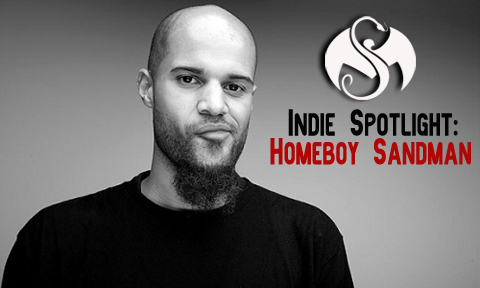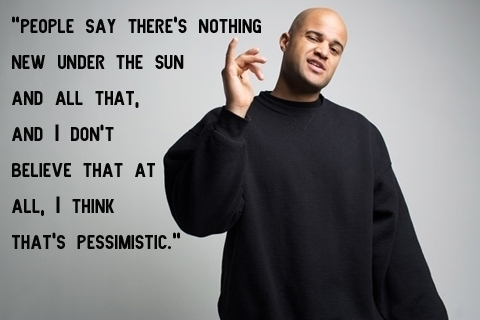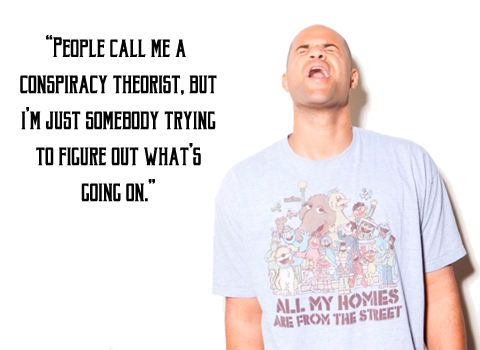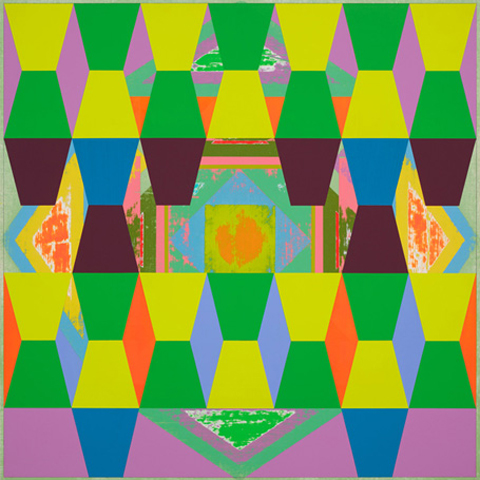Indie Spotlight: Homeboy Sandman
Feb 27 2014
If you ask Homeboy Sandman what his name means, he will probably say something along the lines of him being the master of a realm where everyone is sleeping or dreaming. This definition couldn’t be more on point.
Over the last seven years, Homeboy Sandman has built a cult following one by one, attracting fans of raw lyricism. His unique perspective and one-of-a-kind delivery have made him stand out among a sea of hip hop lookalikes, and having partnered with Stones Throw Records, Sandman’s output is more prolific and high quality than ever.
Homeboy Sandman, raised in Queens, has worked with artists like Pharoahe Monch, Oddisee, Brother Ali, and many more. His content carries weight without sounding preachy or contrived, and his rhyme patterns and varied deliveries make him one of the most dexterous emcees we’ve ever come across.
We recently sat down with the Stones Throw emcee to speak on the independent life, his leaving law school to become a rapper, the effects of radio brainwash and much more.
If I was showing your music to someone that had never heard you before, do you have 3 tracks that you feel best convey your style & abilities?
You can just pick 3 out of a hat if you want. (Editor’s Note: We did, and we’ve included them throughout the interview.)
Word. You put out your first EP in 2007, when did you actually start rapping and when did it become more than a hobby?
It became more than a hobby in December 2006. That was when I wrote my first sober rhyme, which for me was a big difference from when I was writing rhymes and I was always under the influence of one thing or another.
I didn’t really take it seriously, I felt like I couldn’t really cultivate it in a natural form, so I never had the confidence to ever move forward with it because I always needed a crutch, but it was in December 2006 when I wrote my first sober rhyme and at that point it went from being a hobby to a passion.
For any of our readers that aren’t familiar with you, you were on your way to becoming a lawyer and quit school to pursue hip hop. I’ve also read that your father did pretty much the opposite, he was a great boxer that quit boxing to become a lawyer. Did his transition motivate you to do the opposite and follow your rapping career?
Yeah, definitely. Even though I wound up leaving law school and he wound up going to law school, it was just a story of somebody that did whatever he wanted to do. Because of my father I have an academic background. My father didn’t have any sort of academic background whatsoever. He had the opposite of an academic background. He had very much the background of the last person you’d ever expect to do anything academic, so when he quit fighting at 7-0 and was a contender, everybody looked at him like he must have been crazy, way more than they must have looked at me like I was crazy.
I was quitting law school to start rhyming, but these people know I can rhyme and they still thought I was crazy because everyone’s like, “Go with the sure bet. Go with the safe thing. Don’t go with the passion,” but for my father – this is a dude that never graduated from high school saying “Yo I’m going to be a lawyer. I’m going to stop doing the only thing I’ve ever done,” – which is fight -– “and go do something completely grandiose.” The fact that he was able to do that despite everybody thinking he was crazy – it was real easy for me to make the move I made.
I’ve always thought you and MF DOOM are two of the most underrated lyricists because you’re not overly verbose, yet you still convey very expansive messages. Do you consciously simplify at times or do you just have a very succinct thought process?
I guess some records I look at as more accessible than others. It depends on the mood I’m in, the topic of the record or the beat. It depends on what my goal is, but I think that at certain times I’m able to tap into my English background as an English major and creative writing major: having page limits, limits to what you have to do, but still be able to get ideas across, having to be succinct at certain times. I write songs based on things I’ve been thinking about for years and based on concepts and based on conversations that are six and seven hour long conversations, but I have to put it into three verses. I have to put it into 48 bars. So at times I keep that in mind. Other times I just kind of roam free, but sometimes – like, I think of some specific records I’ve done like “Gun Control” which was very much like that. The record I did called “Angels With Dirty Faces” was very much like that. Even the record I did called “Illuminati”, these are records that could have been 15 verses long, but depending on the record and the subject matter I will be like – not dumbing it down or whatever, but I’ll try to make it a little more digestible.
Your latest project, All That I Hold Dear, is in my opinion a perfect summation of your style and your growth up until this point. What state of mind did you have going into that project after paying tribute to the essence of hip hop on Kool Herc: Fertile Crescent?
You can tell from the subject matter that this record was very personal to me. Up until Kool Herc, and even with Kool Herc, it’s always been very important to me to be like, yo let me show everybody how crazy I can rap. Like, you look at Kool Herc there’s “Men Are Mortal” on that.
When I was writing “Men Are Mortal”, maybe more so than any other record I’ve done I was like, I’m really gonna showcase my dexterity here and my aptitude at just being so in depth with the technicality of it. I guess maybe after Kool Herc was really the first time that I was like, yo, I kind of feel like I’ve shown that I can do whatever it is I want to do. From a cadence standpoint, from a flow standpoint, from a delivery stand point, I feel like I’ve shown that now. I feel like I’ve kind of made that point. I can ease up for a little bit now and just speak on some stuff.
Like a lot of people tell me that All That I Hold Dear is the most accessible record, like I’m just sitting here talking to people and they understand without having to really peel the layers as much, because I was like now that I’ve shown to others and to myself that I can really do whatever crazy delivery thing I feel like doing, let me try and get in touch with myself and speak on some things that are really important to me.
“Musician” is another track – going back to your last question – that I had to make really succinct, but the mind state…like even though you got songs like “King Kong”, “In A Daze”, “Knock”, where I’m a little bit more cryptic, it still isn’t. You don’t get the full feel on this record.
It’s still kinda laid back with it. I’m like, yo, you know I can do anything, now let me tell you what’s important to me. That’s why I called it All That I Hold Dear, because this isn’t to say that I wasn’t telling people what was important to me in earlier records, but on this record, more so that any of them I was like, “I want you to understand me and get a glimpse into my head and the things that are important to me.” Be they family, be they musicianship, be they relationships – whatever. I just wanted it to be more personal. I didn’t want things flying over people’s heads.
One of my favorite lines from Q-Tip is “I don’t really mind if it’s over your head / ‘Cause the job of resurrectors is to wake up the dead,” so I’ve always had that attitude like yo, I’m gonna make my shit crazy, and if you don’t get it’s your problem. It’s something you need to work on.
I came up as the type of dude that wanted to get wowed with the bars. Every single bar needs to wow me like crazy, even more so than having that connection with the artist. So I kind of felt like all the guys that are like me, all the guys and girls and listeners that are like me, I’ve already shown them the level I’m at and now we can kinda sit down and – we know each other now. We can sit down and just speak.
What do you think is the biggest way in which Hip Hop has benefited humanity?
When I think about how hip hop has benefited humanity, I think of it as another craft that can make people feel empowered without anything. I think that’s what I think hip hop has always essentially been. I think it’s an art form for anybody born under any situation, born under any family circumstance, born under any type of societal or financial duress. I think hip hop can be creative.
For me personally, the best feelings I get are all from creating hip hop music – and hip hop has a bunch of different components like visual arts and dance. There’s all different types of components to anybody who loves the craft and wants to be a part of it, adding to this world in a way that is new. People say there’s nothing new under the sun and all that – and I don’t believe that at all – I think that’s pessimistic.
I think I do things nobody else has ever done or is ever going to do and I think that hip hop provides another opportunity to do that. That to me is how you leave your mark, so that’s sort of important to me about hip hop. A lot of people think about leaving your mark as how many people see your mark, but regardless of how many people see your mark it’s still there. Hip hop is a skill set, a culture and an art form that is open to everybody.
There’s been so much talk lately – as people are becoming notorious for doing hip hop music different ways and doing hip hop and taking it seriously – there’s this conversation of “Is hip hop for everybody, or is it something sacred that certain people don’t have access to?” I don’t feel that way at all. I think hip hop is for anyone in the world that feels moved by it, feels touched by it, and is going to get joy out of adding to the beautiful things that are going on in hip hop music. So that’s what I think hip hop’s greatest contribution to the world has been.
What do you think the music industry will have to do in the coming years to stay financially relevant in a time where someone can stream or download your music for free?
That’s a good question. I put out a mixtape in 2007 or 2008, but ever since then I’ve never offered anything for free. I mean, I’ll give away a song for free here and there but I’ve never given a project away for free.
For me, I want to give people the opportunity to support monetarily, even though people can download whatever, whenever they want. I still feel that there is a lot of support. I guess I wasn’t making records in 1995 when people that could rhyme were going platinum – not to say that that doesn’t happen every now and then now, but obviously at Strange Music y’all know a little bit about that.
I believe that people support records. Everybody wants a piece, but I feel my records get pretty decent support. My merch moves and all that. I’m not the right one to ask about that question because I’m actually happy about how my records sell and I think they’re going to sell more and more when people know how I’m getting busy.
I guess if you look at the whole music industry making less money, or selling records, I don’t really look at the music industry as something that’s even really based off music anymore. There’s all types of revenue streams being generated when people think about music. There’s a whole lot of ad revenue and I basically look at it like there’s a whole lot of product placement going on.
You know, a lot of the people that people think of when they think hip hop – this isn’t to say that here’s no talent involved because there’s some talent here and there – but more often than not you’re going to see walking billboards, not only for products but also for lifestyles that generate a lot of revenue. So I feel like these cats are making money. I know they’re making money.
They might not be selling as many records, but they’re still deciding what clothes everybody buys and how everyone behaves and what cars everybody buys. Like, I believe these are the same people. I don’t believe there’s people that own record labels that are like “Dag, we ain’t makin’ any money sellin’ records, but our artist are making all this money for, you know, Hennessey”. I think they’re like “Yo, at least we’re making Hennessy money,” you know?
People call me a conspiracy theorist, but I’m just somebody trying to figure out what’s going on. But as far as records, my records sell okay.
I’ve seen you talk about how respectful and intelligent Brother Ali’s fan base is from when you two were on tour, is that something you think about when you make music? Or do you just trust that your subject matter will attract like-minded people?
I know it’s going to attract like-minded people, but I don’t want to preach to the choir. I don’t want to make records that – like I have things that I think are important to say. I’m having fun and trying to be myself and celebrate life and I think that’s important. I’m trying to celebrate thought and free thought and free analysis of what’s going on, but I don’t look at myself as someone that’s particularly anointed to really put anybody on to anything.
I’m trying to figure everything out every single day, but I do feel that my ideas are important and that the people that are already like-minded with me – like I said, preaching to the choir. It isn’t helping anybody to have somebody be like, “yeah word.” I think it’s helping to have somebody who wasn’t there to be like, “Oh snap that makes a little sense. I didn’t look at that that way. I didn’t look at hip hop that way. I didn’t look at the word ‘street’ that way. I didn’t look at race that way, or society or the music industry”.
I never think to myself I’ve got to connect with people who are like-minded. I do think to myself: I want this record to be one that connects with people who aren’t going to feel the same way. I want a record to have somewhat of a swing vote and win some of the swing voters. I kind of assume that the other thing is just going to happen on it’s own. I don’t have to put work into that, but I do have to put work into bringing people over to where I’m at.
So…you’re like a hip hop scientist. Like you’re figuring shit out on your own and at the same time sharing your findings and hoping that it gives other people a different perspective.
Yeah definitely, word to that yo: trying to publicize these findings – and that’s why you see the findings be one time one way, another time I do another experiment another way, I’m just trying to do these experiments and let y’all know what happens. I’m just over here with beakers.
There’s a Killer Mike quote that always reminds me of your style, it’s “I’m stuck in a time capsule where rappers actually factual.” If you were given an audience of people that are enamored by the mainstream representation of hip hop, what would you say to them?
What would I say to them? I mean I would kick a rhyme. I would kick a rhyme to get them to realize what I can do that they’re not aware of. That’s the first thing that I would do.
When I was teaching, I taught kids that were enamored by the mainstream idea of hip hop. I wasn’t kicking rhymes then, but I was bringing them rhymes. I was bringing Mos Def “Beef”. I was bringing in De La Soul records, records they didn’t know. They was just hearing G-Unit records.
But real talent, a real craft, I believe that’s undeniable. That gives me hope. I would always start by saying, “Here’s what you haven’t been seeing.” People talk about underground and all that, and I don’t believe in that. I know that the people who determine what is on the radio know that if they would play Strange Music on the radio, people would rock with it. If they played Homeboy on the radio, people would rock with it. They know that we would have better conversion rates than a lot of the cats they’re putting on, but they know they’re going to lose other revenue streams if they put us on, because we’re going to have people thinking, and we’re going to empower people, and make it about talent and art and make it about self, because we’re going to be expressing ourselves for real, and that’s going to make people express themselves for real without being these mindless drones.
I would start by kicking a rhyme, that’s what I always do. I got to schools and centers all the time and talk with youth all the time, and I always start by kicking a rhyme like, “Yo here’s what you haven’t been seeing, this hasn’t been here for you”. After that, I could say anything.
After that I could talk to them about how mainstream hip hop is a tool for racism, the likes of which the world has never seen. I’d talk to them about media and communications and all types of stuff after that, but I would definitely start by showing them something I can do. That’s an undeniable thing.
Ask yourself why you haven’t heard about it. Ask yourself why the people you admire and revere and one day hope to be are spitting things you yourself could write. Why hasn’t it always been this way? People never used to listen to Stevie Wonder and go, “Yo, I could do that.” People used to listen to music and be blown away by the art form.
From hearing you speak in interviews, you’re very confident about your abilities yet you keep this certain degree of humility in your music, which is a far cry from the kind of in-your-face arrogance you find in a lot of other hip hop. What do you personally strive for when making music? You’re clearly not out to be the most flashy or the biggest star in music overnight. What is your personal goal point within hip hop?
Man, I want to make stuff unlike anything that’s ever been made. I want to be a specialist and I want people to say that this is a one of a kind. I want people to hear it and feel like it’s one of a kind.
Like how I brought up Stevie before – I’m a huge Stevie fan. I’m a huge Billy Joel fan. I’m a huge fan of people who, If I want to tap into that vibe, I gotta go to them. You can’t go no place else to get that Stevie, you can’t go anywhere else to get that audio love, you have to go to Stevie. That’s what he’s there for. That’s what he’s all about.
I said in other interviews like, before I even knew what a biter was, I knew I didn’t want to be a biter. I remember hearing records of biters and I was a kid but I was like, “Dag, I don’t want to be a biter, these cats catch flack.” I don’t want to plague myself throughout all facets of life. That is very much something I’m always keeping in mind.
I want all my records to sound different. All my albums sound different form the last one. I got my 11th release coming out, and don’t none of them joints sound like the last one or the next tone. I want to be one of a kind in everything I do. I hate biting so much, I don’t want to bite myself. I want to be the only place you can go to tap into that Homeboy Sandman lyricism. You want that level of lyricism? You have to go through me. You want this level of insights presented in this way? Nobody can do what I do. I’m one of a kind and I stand alone.
I don’t get into conversations of who’s the best and all that, because to me you’re the best if you stand alone. There’s people out there that do things that I couldn’t do. To me they’re the best. To me, I’m the best, not because I’m better than others, but because I stand alone and people cannot do what I do.
That’s something I always keep in mind, standing alone. This ain’t no cookie cutter, that’s bite-proof. Other people couldn’t make it if they wanted to make it. You’re not going to make a Homeboy Sandman record.
Anything else you’d like to say before we wrap this up?
Peace and love, thanks for spreading the word. Shouts to Strange, I know you guys probably know your reputation has just been the success story of indie music, as far as touring, as far as doing it on your own, so big shouts to y’all, and it’s very cool to be involved. Also, White Sands coming out February 25th, and…peace and love.
– Like Homeboy Sandman On Facebook
– Peep Homeboy Sandman’s website
CLICK HERE TO PURCHASE HOMEBOY SANDMAN’S
LATEST PROJECT WHITE SANDS
- – What do you think of Homeboy Sandman?
- – Who do you want to see us interview next?
Get at us in the comments section below!




